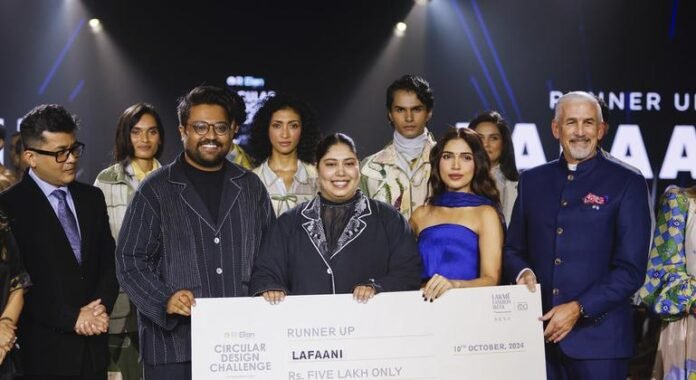Seven participants presented their designer outfits at the finals of the sixth edition of the Circular Design Challenge competition organized in collaboration with the United Nations in India.
Organized in collaboration with the Fashion Design Council of India (FDCI), this sustainable fashion show saw all the designers enthrall the audience by presenting sustainable fashion apparel and products.
The sixth edition’s finalists included participants from several countries: Wenyan Xu and Meng Wang of the European Union (Saltless); Sang Fan Yu from the Asia-Pacific Group of Countries; Sylvia Asien from Britain; Gautam Malik (Gur), Ritvik Khanna (Archive City) and Chandini Batra (A Blunt Story), and Rashmik Bose and Drishti Modi (Lafaani) join as wildcard entries from India.
The prestigious jury for the final stage of the competition consists of the stalwarts of the fashion industry. These include Shamby Sharp, UN Resident Coordinator in India, and actress Bhumi Pednekar, UNDP’s SDG advocate.
Designer Hrithik Khanna’s Rkive City label has been declared the winner of the sixth edition of the Circular Design Challenge, Drishti Modi and Rashmik Bose’s Lafani brand has been declared the runner-up.
Ritvik Khanna who won on the occasion said, “I think this win for us is proof of our belief that our beliefs are right. “The clothes we make and upcycling will help the next generation of people believe it’s possible.”
The Circular Design Challenge (CDC), since its launch in 2018, has become a leading platform for emerging talents in sustainable fashion to showcase their circular innovations globally.
The Circular Design Challenge, in its sixth edition, has traveled the world to discover these innovators in partnership with global organizations such as the British Council, Istituto Marangoni and Redress.
The jury included industry experts and leading international media influencers from London, Milan, Hong Kong and Mumbai on intercontinental tours.
Speaking at the event, Shamby Sharp, UN Resident Coordinator in India, said, “We are helping to drive innovation in energy efficiency and the use of ethically sourced materials, along with our partners in the Circular Design Challenge competition.”
Inspiration to make the fashion industry sustainable
Presented in India in partnership with the United Nations, the Circular Design Competition paves the way for a greener and more sustainable future by encouraging eco-conscious creativity. It is trying to solve the important issues of waste and carbon footprint in the fashion industry.
Circular Design Competition is playing an important role in encouraging India’s fashion industry to adopt eco-friendly solutions.
It aims to provide a global platform to encourage sustainable fashion talent to find scalable, waste-reducing solutions. Started in India six years ago. In 2023, its scope increased and for the first time it was organized globally.

The winner of the Circular Design Competition 2024 was awarded Rs 15 lakh, a CDC trophy and a six-month mentorship programme.
They will be given an opportunity to present their products separately at Lakmé Fashion Week 2025. The runner-up was awarded Rs 5 lakh in funding and mentoring.
Circular Design Competition Finalist
Gautam Malik- Re-imagining waste
When he started Jaggery Bag in 2018, Gautam Malik had one goal, to transform waste into wearable art.
He has designed a stunning line of clothing using waste materials such as car seatbelts, cargo belts, decommissioned military parachutes, ex-army canvas and old army tents, giving a new direction to waste generated from the automobile and defense sectors.
Apart from recycling waste, it has also helped in supporting artisans, empowering women and recycling plastics.
Chandni Batra – Sustainable footprint
Chandni Batra’s ‘Blunt Story’ is a footwear line that eliminates the use of plastic and crude oil by creating shoe soles made from plant-based, recycled materials.
Natural materials like cork and rice husk are used in these shoes instead of synthetics.
Attempts have been made to reduce the carbon footprint by using soy and palm oil as plasticizers. With a 96 percent bio-based uncrushed foot bed, these shoes keep feet cool, dry and toxin-free.
Hrithik Khanna – Sustainable Ecosystems
Hrithik Khanna’s brand Rkive City specializes in up-cycled denim.
The collection titled “First Conclusion” was conceptualized using old threads, zipper buttons and items saved for future use.
Patchwork, paneling etc. were used for stability. The popularity of this brand has grown rapidly not only in India but also globally.
Drishti Modi and Rashmik Bose- Biodegradable clothing
Lafani label was started by Drishti Modi and Rashmik Bose three years ago. Under this they design 100 percent bio-degradable clothing.
The duo used art cotton from Gujarat, temple flowers from Maharashtra and cotton from Tamil Nadu, Karnataka and West Bengal for hand-painted textiles.
Lafani’s sustainability efforts include sourcing organic and brown cotton from rainfed areas, handwoven fabrics, natural azo-free dyeing, zero waste systems, sustainable packaging, minimal carbon footprint and recycling.
His collection “Meadows” was enchanted in deep olive green, yellow, blue and white.
Sang Fan Yu – Contemporary Fashion

Sang Fan Yu recycles textile waste from local Japanese sources, such as kimonos and life jackets, and combines them with natural materials such as pineapple fiber and apple leather to create the products.
This helps prevent waste from going to landfill through recycling.
Sylvia Essien – A Poetic Quest

The Silvia Essien brand is based on inspiration from Asian nature. Their collection, “The Freckle” collection, created innovative products using Himalayan nettle, pineapple fiber, Tencel, regenerative merino wool and organic cotton.
Attractive clothes such as strappy dresses, minis, blouses, pants etc. are made by dyeing clothes with natural plant dyes.
Among them, dried branches collected from the mountains of Spain were transformed into various products using interesting Spanish weaving techniques.
Meng Wang and Wenyan Xu – A Historical Tribute to Fashion
Meng Wang and Wenyan Xu’s brand Saltless was launched in 2019 in Lima, Milan. It combines timeless Italian craftsmanship with durability.
About 80 percent of the products were made from recycled clothing and factory waste materials. Jackets, skirts, multi-pocket pants, gilets, coats and maxis made from them had a bold, military style, which was futuristic.

